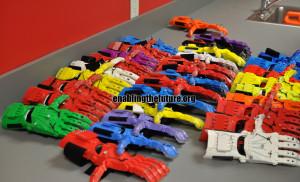How 3d printing will impact medicine
I’ve followed 3d printing in medicine very closely and recently attended the Inside 3d Printing Conference medical track in NYC. I learned about some new and upcoming applications for 3d printing and its clear that the technology of additive manufacturing will make a large impact on all industries, with medicine and surgery at the forefront.
3d printers work by building layers of materials to create a physical object. There are several types of printers, but the most basic extrusion version is essentially a tiny glue gun that builds a structure, driven by a computer. In the video above I explain it in a simplistic way with a handheld printer called the 3doodler.
3d printing supports surgical customization
One of the amazing benefits of 3d printing is that custom surgical implants, either synthetic or made of living tissue, can be created in a short period of time. One U.S. company is currently making custom bone-like implants and others are surely on the way. Eventually, tissue regeneration and living cells will be able to be created with a printer, specifically made for one person. Customization will benefit patients by improving implant fit, function, and surgical placement.
3d-printed surgical planning models
3d printers are used to create models of a person’s anatomy before surgery is performed. In this way for complex cases, surgeons can plan and visualize a procedure before walking into the operating room.
3d printing sparks medical innovation
Surgical tools and devices can be prototyped with 3d printers, cutting costs and making the design and fabrication process more accessible to doctors who have new and practical ideas. I used 3d printers to design and create 2 surgical instruments that didn’t previously exist in the marketplace.
3d printers facilitate crowdsourced volunteerism
At the Inside 3d Printing Conference I learned of an organization called E-NABLE that gives free 3d printed hand prosthetics to children and adults who need them. Volunteers with printers in the E-NABLE community build and assemble the parts from plans that are available for free. Their program has reached children around the world.
The hands can be made with superhero-themed colors and spare parts can be made by the users themselves. Many of the recipient children experienced dramatically improved social interactions and acceptance of their disabilities. I urge you to visit their website learn about this truly touching and inspiring result of the 3d printing revolution: enablingthefuture.org
Share this entry
Interesting links
Here are some interesting links for you! Enjoy your stay :)Pages
- 5 Steps to Looking Younger
- About
- After Botox/Dysport: “Spock Brow”/Over-arched Brow
- Asian Double Eyelid Lift Surgery in NYC
- Asymmetric Eyelids
- Before and After Portfolio
- Before/After Cosmetic Oculoplastic Surgery
- Blepharoplasty in NYC with an oculoplastic surgeon
- Books
- Botox and Dysport in NYC with an oculoplastic surgeon
- Botox/Dysport/Xeomin
- Brow Lift
- Brow lifts
- Brow Ptosis
- Cannula Tear Trough Under-Eye Filler best for Eye Bags NYC
- Canthopexy and Canthoplasty
- Cheek Redefining
- Chemosis
- consent- biopsy
- consent- blepharoplasty
- consent- brow lift
- consent- chalazion
- consent- cosmetic injection
- consent- double eyelid
- consent- eyelid ptosis
- consent- facelift
- consent- facial implant
- consent- filler dissolving enzyme
- consent- laser or chemical skin peel
- consent- liposuction
- consent- pronox
- consent- revision surgery
- consent- sculptra
- consent- surgery chaperone
- consent- thread lift
- Contact
- Cosmetic Eyelid Surgery Guide
- COVID-19 Measures
- Crow’s Feet
- Dark Circles and Eye Bags
- Double Eyelid Surgery Guide
- Dr. Kotlus Blog
- Droopy Eyelid Ptosis Surgery
- Eye Bags and Dark Circles Treatments
- Eyebrows
- Eyelid Conditions
- Eyelid Procedure Affects
- Eyelid Ptosis Repair
- Eyelid Retraction
- Eyelid Revision Surgery
- Eyelid Skin Fat Deposits
- Eyelid Veins
- Facials
- Fat Transfer, Fat Grafting
- Festoons
- Festoons and Malar Bags
- Glabellar Furrows
- Hollow Under-Eyes
- Home: Dr. Kotlus NYC Oculoplastic Surgeon | Blepharoplasty | Eye fillers
- Lacrimal Gland Prolapse
- Lateral Canthal Blunting
- Lateral Canthal Rounding
- Lectures and Presentations
- Lid Ptosis
- Lip Enhancement
- Liposuction
- Loose Lower Eyelid Skin
- Loss of Eyelid Skin Pigment
- Lower Blepharoplasty (Lower Eyelid Lift)
- Lower Eyelid Bags
- Lower Eyelid Conditions
- Lower Eyelid Fat Pad Reduction/Repositioning
- Lower Eyelid Skin Pinch
- Lower Eyelid Skin Resurfacing
- Lumps/Irregularities
- Necklift and Facelift NYC
- Nose
- Orbicularis Oculi Muscle Tightening
- Other Eyelid Concerns
- Patient Forms
- Patient Reviews
- Pause and Reverse: How to Look Younger Than Your Age With or Without Cosmetic Surgery
- PDO Thread Lift NYC
- Privacy Policy
- Procedures
- Research and Publications
- Residual Fat After Blepharoplasty
- Soof Lift
- Superior Sulcus
- Tame Your Eye Bags and Dark Circles
- Thank you for requesting your NY Thread Lift Consultation
- Transverse Brow Furrows
- Treatment of Chemosis
- Treatment: Lacrimal Gland Suspension (Sagging Tear Gland)
- Treatment: Botox “Spock Brow”
- Treatment: Eyelid Droop After Botulinum Toxin (Botox, Dysport, Xeomin)
- Treatment: Eyelids
- Treatment: Fat Pouches After Eyelid Lift
- Treatment: Festoons
- Treatment: Lower Eyelid Retraction
- Treatment: Lumps After Fillers
- Treatment: Superior Sulcus (Upper Eyelid Hollowing)
- Treatment: Tyndall Effect
- Treatments: Brow
- Treatments: Brow and Forehead Wrinkles
- Treatments: Crow’s Feet
- Treatments: Hollow Lower Eyelid/Tear Trough
- Treatments: Lower Eyelids
- Treatments: Under-Eye Dark Circles
- Treatments: Upper Eyelid
- Tyndall Effect: Blue Discoloration After Hyaluronic Filler
- Under-Eye Dark Circles
- Upper Blepharoplasty (Upper Eyelid Lift)
- Upper Dermatochalasis
- Upper East Side Manhattan Location | NYC Cosmetic Eyelid Plastic Surgeon
- Upper Eyelid Conditions
- Upper Eyelid Lift NYC
- Upper Eyelid Treatments
- Upper Steatoblepharon
- Wrinkle Treatment Fillers | Botox | Laser | Microneedling NY
- Younger Podcast: Expert Advice on How to Look Younger and Live Longer
- 雙眼皮手術頁



